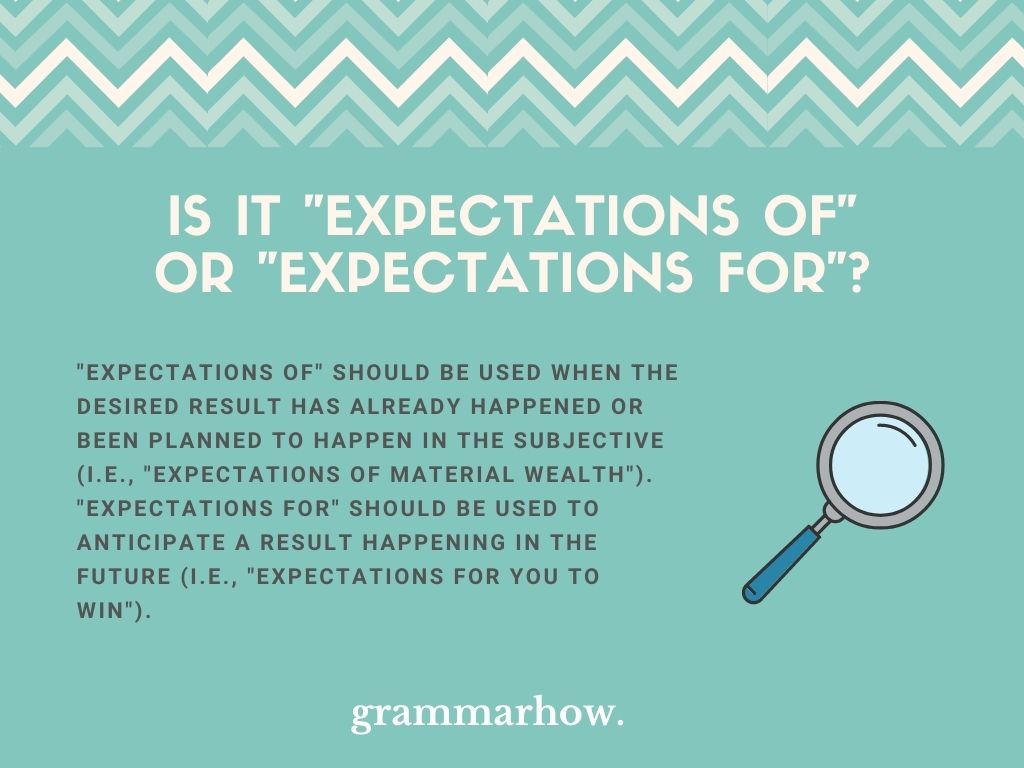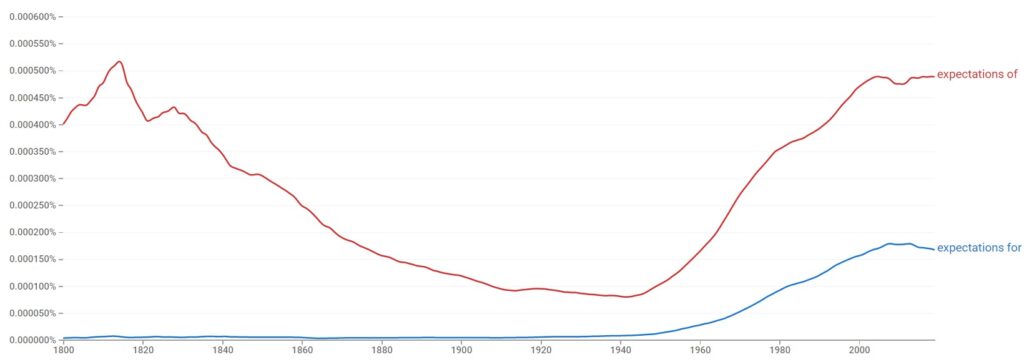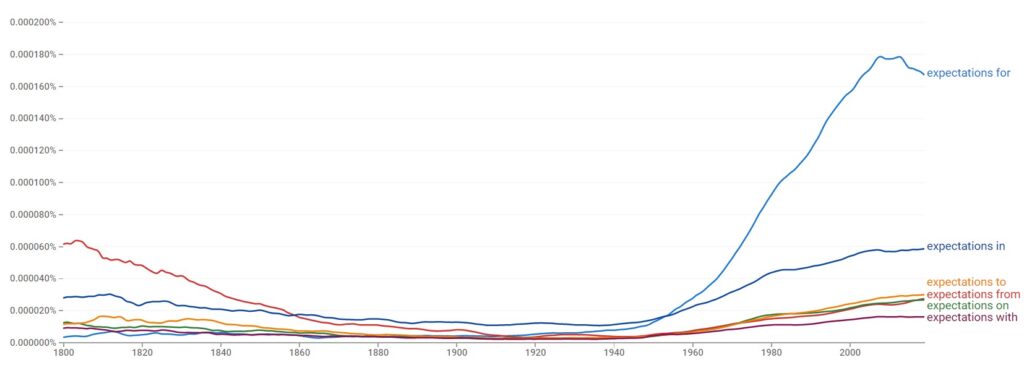Sometimes, prepositions have a very obvious impact on the overall meaning of a word. In this article, we’ll look at the impact that “expectations of” and “expectations for” deliver to a sentence and what the differences between the two are.
Is It “Expectations Of” Or “Expectations For”?
“Expectations of” should be used when the desired result has already happened or been planned to happen in the subjective (i.e., “expectations of material wealth”). “Expectations for” should be used to anticipate a result happening in the future (i.e., “expectations for you to win”).

According to The Cambridge Dictionary, the definition of “expectations” is “the feeling or belief that something will or should happen.”
We can use that meaning for both incidences. “Expectations of” is used when the feeling is that something should happen, while “expectations for” is used when the belief that something will happen in the future.
Is “Expectations Of” Or “Expectations For” Used The Most?
We find that when we’re talking with prepositions, one of the easiest ways to explore the major differences between the two is to look at some statistics. We’ve compiled some that help us to demonstrate which of the two phrases is more popular.
Generally, the more popular a phrase, the more likely you will be to use it. Since more native speakers are using more popular words, you’ll want to focus most of your attention on that.
According to this graph, “expectations of” is by far the most popular choice. It’s used much more often than “expectations for.” That’s because it’s more common to talk about previous expectations you had that have been hit rather than worrying about new ones.

Also, according to Google, “expectations of” is mentioned 10,900 times on The New York Times website, while “expectations for” is mentioned 7,540 times.
The numbers on the New York Times website are much closer than the graph would have you believe. However, we think that “expectations of” is generally the more common of the two in most other writing outlets.
You’ll often find yourself talking about expectations that have been met (more appropriately, “expectations of”). “Expectations for” refers to expectations you’ve set, but there’s no guarantee you’ll hit them, which is something a lot of people don’t like to do openly.
What Does It Mean To Have Expectations Of Or For?
So, what is the meaning of the two words? It’s great to look through how the prepositions affect it, but we haven’t really touched on what it means to have an expectation.
Generally, “expectations of” and “expectations for” refer to a goal or desired effect that we’re chasing. We set up expectations to try and hit particular goals related to life, our career, or our friends.
There are multiple instances where we might set up expectations. It might be something as simple as expecting your loved ones to do the bare minimum of work around the house to make your day easier. It might be more complicated, and you may expect someone to win a tournament they’ve been working hard towards.
Either way, it’s important to understand that “expectations” is a noun that means the same thing whether you use “of” or “for” after it. The only difference comes from how the prepositions change the direct meaning.
- Expectations of
You have already set a goal or target this time, and it’s expected to be hit. There’s very little risk in making “expectations of” something because there’s almost always a guarantee that those goals will be achieved before they need to be.
- Expectations for
This time, we’re working on wishing something to happen. We might be supporting a friend or coworker, or we might be setting our life ambitions for a particular job. Either way, there’s no guarantee that the outcome will be met, but there’s still an expectation for it.
Examples Of How To Use “Expectations Of” In A Sentence
To help you understand them better, we’ll go over some examples. We feel like examples are some of the best ways for you to learn how to get these prepositions to work.
“Expectations of” talks about a guarantee that has already happened or will happen soon in the future. The guarantee is what’s most important about using “expectations of.”
- I put forward plenty of expectations of great weather, and they all came true.
- The business has expectations of serious financial gain in the third quarter.
- We can always relate to our expectations of the sun setting every day.
- You’ve consistently met my expectations of excellence.
- We have a high standard to uphold. You must meet the expectations of the parents.
- The expectations of my teachers are impossible to keep up with.
As you can see, “expectations of” refers to something that somebody expects of you and is usually a guarantee. It refers to the desired result that’s already formulated and is often written in subjective form.
This means that the expectations affect the subject of the sentence (usually, the people speaking will indicate who or what that is).
Examples Of How To Use “Expectations For” In A Sentence
Now let’s see how “expectations for” is used. While this is the less popular option of the two, it still has plenty of valid uses in English. We’ll cover as many as we can.
“Expectations for” talks about a goal or target you’ve set yourself or set for somebody else. Generally, there’s no guarantee that the goal will be hit, but we can at the very least hope for them to do so.
- I have great expectations for what you’re going to be capable of in this classroom.
- We have high expectations for you, son!
- I know he’ll win; I have high expectations for him.
- We have expectations for the gods to smile upon us tonight.
- Are there any expectations for a white winter this year?
- I have plenty of expectations for where I want to go in life.
This time, “expectations for” is used to talk about things we want to achieve or targets that might currently be out of reach. We usually use “expectations for” to set up future events.
The future portion of the meaning of “expectations for” is what’s most important. It also deals with the objective form, meaning the object of the sentence is what we wish to happen.
Which Other Prepositions Can Be Used With “Expectations”?
While we’ve spoken about “expectations of” and “expectations for” in great detail, there’s one final section we want to cover that shows all the other prepositions used.
According to this graph, there are five other potential candidates for a preposition to follow “expectations.” We’ve included “expectations for” as a comparison.

All of these prepositions are less common than “for,” which is even less common than “of,” so it’s rare you’ll come across them. Still, we believe it’s important to see what they mean and how they work.
Expectations In
“Expectations in” should be used when you’re talking about a specific field or subject where you have desired goals or targets. It has to refer to being “inside” a topic.
- I have many expectations in geology to find the rocks I like.
Expectations To
“Expectations to” talks about something that we want to achieve. It always refers to a future goal of our own making, similar to “expectations for.” However, “to” is used to reference a goal specifically.
- I have expectations to achieve a medal in my sport.
Expectations From
“Expectations from” should be used when someone else has provided expectations for you. We use “from” to talk about where those expectations have come from.
- I have expectations from my mother to perform well at school.
Expectations On
“Expectations on” should be used when talking about achieving a goal in a specific field or subject. It’s similar to “expectation to” or “for,” but is not particularly common. Generally, somebody has given those expectations to us.
- I have been given expectations on what they want to happen in my future.
Expectations With
“Expectations with” should be used when we’ve set up expectations with another person or we intend to achieve them with somebody else.
- I have expectations with my wife to move into our dream home in five years.
Expectations – Synonyms
- Belief
If we have a belief about something, we’re hoping it comes true in the future, much like “expectations.”
- Hopes
We can also have hopes (and dreams) that we intend to hit at some stage in our life.
Do You Have High Expectations Of Or For Someone?
“High expectations for someone” is used when we want to encourage them to perform well at something that hasn’t happened yet. “High expectations of someone” is used when we know someone will perform well at something, and it’s guaranteed (not a competition).
You may also like: 10 Better Ways To Say “High Expectations” (Synonyms)
What Is The Difference Between “Expectation” And “Expectations”?
“Expectation” is less common because it’s the singular form of “expectations.” Usually, we’re referring to more than one hope or dream for the individual, which is why “expectations” is more common in plural form.
Are Expectations Good Or Bad?
Expectations can be good if you’re hoping that you or somebody else does well in something. They can also be bad if you’re expecting somebody you know to fail.
You may also like: 10 Better Ways To Say “Not Meeting Expectations”

Martin holds a Master’s degree in Finance and International Business. He has six years of experience in professional communication with clients, executives, and colleagues. Furthermore, he has teaching experience from Aarhus University. Martin has been featured as an expert in communication and teaching on Forbes and Shopify. Read more about Martin here.
